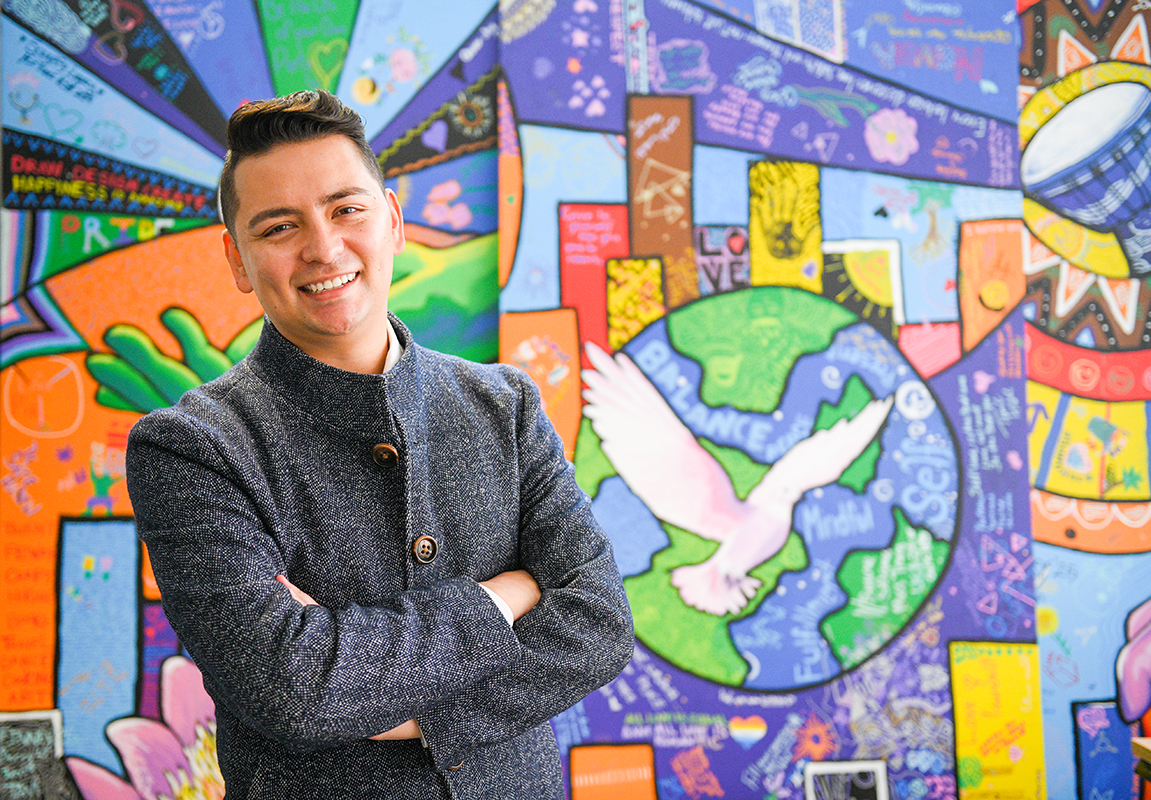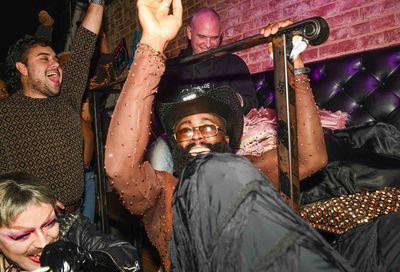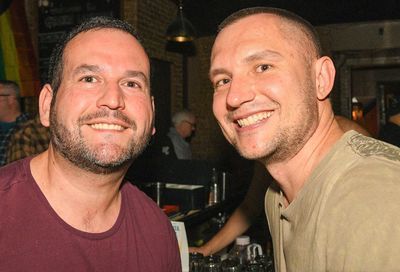The Kids Are All Right
A View from DC's Youth Pride Day 2007
Unlike the past two years, it didn’t rain. And by midday, there was an exuberant mood and plenty to see and do at the 11th annual Youth Pride Day, held Saturday, April 28, at P Street Park, 23rd and P Streets NW.
Whether it was Cookie Buffet’s rainbow-feathered, lip-synching performance, a friendly game of volleyball, appearances by former NBA player John Amaechi and Mayor Adrian M. Fenty, or just lounging on the grass with friends, chances are the crowd of more than 500 people who attended this year’s event found some fun in one way or another.
Where else would you expect to run into a 24-year-old participant in an orange-monkey-with-a-thong costume?
”Today is about free-spirited people,” said monkey-man Nick Kelber. ”If I can walk around dressed like a monkey, then other people should not have to worry about their sexual [orientation].”
And while self-expression played a big role in the carefree atmosphere, Youth Pride Day was about much more than that.
”It symbolizes visibility and acceptance and in some ways home,” said Tyrone Hanley, president of the Youth Pride Alliance Board. ”A lot of these youth, when they go back to school, probably don’t feel like they fit in, or that people are accepting of them. But this is a place where it’s okay to be themselves, to dance and hold hands with their boyfriends or girlfriends or whomever.”
Sara Mindel, vice president of the Youth Pride Alliance Board and director of the day’s event, also emphasized how important Youth Pride can be for the area’s GLBT youth.
”It gives kids a chance to come and not have to feel weird,” she explained. ”They can be with their friends and be who they are and have a really good time.”
It’s also a place where young gay, lesbian, bisexual, transgender people — or those questioning any aspect of their sexuality — can learn about the various organizations in the Washington area that offer the resources they might need in the future.
This year more than 50 organizations set up booths at the event and together contributed about $1,500 to the Youth Pride Alliance, according to Hanley.
”We’ve actually had a number of new organizations, that haven’t had a booth here before, like Transgender Health Empowerment (THE),” he pointed out.
In addition to THE, several groups representing colleges, universities, religious organizations, sporting groups and health-related services were on hand, including the Capital Tennis Association, the DC Area Transmasculine Society, Equality Virginia, American University and Temple Beth Ami.
It’s these groups that Michael Sessa, president of The Center — Home for GLBT in Metro DC, says he thinks can help GLBT youth.
”What gay youth face today is the discrepancy between being totally integrated into society and maintaining [a] gay identity,” he said. ”Is it more important to maintain your gay identify and hang with your gay friends, or should we live as one total society? Right now it’s difficult because while we all want to live in one world, if we didn’t have these support structures, we’d all be afraid, or beaten up, or just not able to really be who we want to be. It takes safety to do that.”
While allowing them to express themselves in a safe and supportive environment, Youth Pride Day also offers gay youth the opportunity to hear local and national activists speak about their own experiences in the struggle to sustain equal rights.
”Say it loud, I’m proud, I’m proud!” declared Darlene Nipper, former director of the Mayor’s Office of LGBT Affairs, upon receiving an award for being an ally to the GLBT youth community.
”I am so proud to be a member of this community. I’ve been told that I’ve gotten old, ya’ll, but remember this: I came out when I was 12. And at 12 there weren’t a lot of organizations like [Sexual Minority Youth Assistance League] and THE,” she offered.
”I remember there was no one I could talk to,…so I hid who I was. And my wish for all youth who are dealing with gender identity and expression and sexual orientation, is that no matter what your orientation is, no matter what your gender identity is, no matter what you choose to call yourself, no one will force you to hide who you are. Be who you are and be proud and I promise you that Darlene Nipper will be right here to support you every step of the way.”
Cheryl Spector pointed out the significance of celebrating Youth Pride Day at the P Street Park, during her acceptance speech as another youth ally.
”This spot was the site of the first National AIDS Candlelight Vigil in 1993,” she told the crowd. ”The fact that Youth Pride continues on this piece of land is history. You are making history by being here.”
Other speakers included Eleanor Holmes Norton, D.C.’s delegate to the House of Representatives, and Fenty, who brought his two sons and declared April 28 Youth Pride Day.
”That’s pretty significant, that the District of Columbia recognizes LGBTQ youth as members of the city,” Hanley said. ”A lot of youth were excited that the mayor was there, and that made me feel better about the event, that the mayor cared enough to be a part of it.”
Amaechi kept his speech short and sweet.
”It’s a pleasure to be here,” he said, ”I get a lot of praise and a lot people saying how courageous I am…. I wanted people here to know, that I think it’s the young people who are the brave ones, and I’m very pleased that there’s an official Youth Pride Day in D.C.”
When speaking to Metro Weekly Amaechi said he intentionally kept his speech short.
”What I wanted to do was make it clear that I didn’t just arrive to come up on the stage and then leave, I’ve been here for two to three hours…. I’m invested,” he said while pointing to the message written on the Youth Pride Alliance’s posters: ”awareness and visibility.”
Ben Heisler, a 19-year-old sophomore at American University who came out to his parents at 12, agrees with Amaechi’s assessment.
”[Today’s] just a really fun and inclusive experience,” Heisler said. ”People come and just enjoy being themselves. It’s important for youth, because when you’re in high school and younger you don’t have that inclusive [gay] community feeling that you get when you’re in your 20s or 30s and you’re going to bars with your friends. It’s kind of their only chance to be a part of the community.”
With a hint of nostalgia, Sessa wondered aloud how his own life might have differed had there been a youth pride event in his hometown.
”I wish I had this when I was growing up in Boston,” he said. ”We didn’t have a Youth Pride. I’m not sure if I would have come when I was a youth — because I didn’t come out until I was 22 or 23 — but if I had something like this, maybe I would have came out a little earlier. Who knows? I didn’t have something like this, that’s why, long story short, I’m the president of The Center. I want to make sure that there are resources and places for people that want them and need them.”
Support Metro Weekly’s Journalism
These are challenging times for news organizations. And yet it’s crucial we stay active and provide vital resources and information to both our local readers and the world. So won’t you please take a moment and consider supporting Metro Weekly with a membership? For as little as $5 a month, you can help ensure Metro Weekly magazine and MetroWeekly.com remain free, viable resources as we provide the best, most diverse, culturally-resonant LGBTQ coverage in both the D.C. region and around the world. Memberships come with exclusive perks and discounts, your own personal digital delivery of each week’s magazine (and an archive), access to our Member's Lounge when it launches this fall, and exclusive members-only items like Metro Weekly Membership Mugs and Tote Bags! Check out all our membership levels here and please join us today!



























